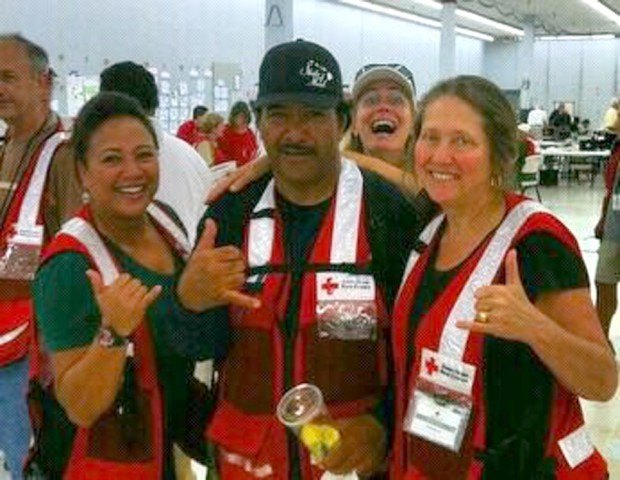LIHU‘E — In the wake of the aftermath of Hurricane Isaac, the Hawai‘i Red Cross has deployed 21 volunteers in support of victims in Louisiana and Mississippi. One of the volunteers includes Michele Molineaux of Kaua‘i, who is working in
LIHU‘E — In the wake of the aftermath of Hurricane Isaac, the Hawai‘i Red Cross has deployed 21 volunteers in support of victims in Louisiana and Mississippi.
One of the volunteers includes Michele Molineaux of Kaua‘i, who is working in relief shelters.
Coralie Chun-Matayoshi, CEO of the American Red Cross, Hawai‘i State Chapter, said it is good to see volunteers from Kaua‘i, because it helps the island in the long run to have a disaster action team with field experience to go along with training.
“When these people return, they can help Hawai‘i when we get a big disaster,” Chun-Matayoshi said. “It is good to have people on all the islands with experience because they may be on their own temporarily if a disaster forces harbors and airports to close.”
On Saturday alone, the Red Cross reported distributing more than 16,000 items to people. A Red Cross Disaster Assessment team is plotting more distribution routes to bring hot meals and water along with cleanup supplies in the damaged areas.
Even for people that have not lost their homes, Chun-Matayoshi said there will be moldy and spoiled food, plus no electricity to more than 100,000 homes. She said the effort could go on for weeks or months.
“This is a very large relief response that will last a long time and is estimated to cost the Red Cross tens of millions (of dollars),” Chun-Matayoshi said. “People think it’s all over after the storm, but it’s just begun and there is still a huge need for support.”
The volunteers are driving through neighborhoods distributing clean up kits, tarps, rakes, coolers, raincoats, flashlights, gloves and other recovery gear, Chun-Matayoshi said.
Renise Bayne of O‘ahu has been driving the emergency response vehicle from neighborhood to neighborhood, knocking on doors to bring meals and supplies. She updated Chun-Matayoshi on her drive to New Orleans from relief headquarters in Baton Rouge.
“We saw houses with roof damage and fences down, and billboards were shredded and street signs were on the ground,” Bayne said in an Aug. 28 report. “Locals approached us asking for help for food because their homes were flooded and utilities are out. We referred them to their nearest shelter.”
There is not a lot of communication going back and forth but there are texts and emails with the occasional update.
“When I went to support Hurricane Katrina in 2005, they didn’t have Twitter and Facebook, and at least now we can communicate a little bit,” Chun-Matayoshi said.
Around 125 volunteers are living on cots in churches and staff shelters with two showers, she said, and most volunteers work 12 hour shifts at shelters around the clock, helping people to locate relatives and address other concerns.
The volunteers come from all professions and backgrounds. The health and mental health professionals and caseworkers are useful in shelters with victims, she said.
Most volunteers are on a three-week deployment, Chun-Matayoshi said, and the nurses sometimes can only make a two-week commitment because of their responsibilities.
The volunteers don’t mind because they are helping people in need, and know they will come back to a warm bed and a hot meal, she said.
Logistic people and drivers are helpful with transferring and delivering supply pallets. Information and Technology people are helpful with setting up communications and computer networks.
There is also a need for public relations, finance, fundraising and all types of jobs that help with any given situation, Chun-Matayoshi said. They only requirement is an overriding passion to help people.
There is an interview to ensure that someone won’t likely have a difficult time with the emotional stress involved in working with disaster victims.
Red Cross training and exercises are essential in knowing what to do in a traumatic and chaotic situation, but she said it’s only when volunteers put their training to work in the field that the reality of the need hits home.
“They need to be able to handle the trauma and that is why we deploy,” she said. “It’s really important for us to prepare as sometimes there is so much heartache for these people and it’s hard to handle.”
The Hawai‘i response team sent volunteers following the earthquake in American Samoa, Hurricanes Ike and Irene, and various tornadoes in the Midwest. They also respond locally to everything from a house fire or flood to a major disaster.
A volunteer goes through a minimum of 20 hours disaster training basics in sheltering and case work, Chun-Matayoshi said. They also prefer local experience with disaster action teams who are on call via a hotline to first responders fire, civil defense and police.
Nationwide, the Red Cross responds to 70,000 disasters each year. The Hawai‘i action teams respond to a disaster once every four days on average, she said.
“Within two hours of any disaster, we deploy a disaster action team and have a hotline to volunteer operators on each island,” Chun-Matayoshi said.
The system is effective but largely invisible, she added. It’s about being ready and it is a good time to let people know that September is National Preparedness Month and to look for the new, free Red Cross Hurricane App online.
All funds donated to Hawai‘i Red Cross (www.hawaiiredcross.org) and designated for Isaac relief will go directly to that effort, Chun-Matayoshi said. The Hawai‘i chapter will get credit from state residents donating to Isaac if donations are made directly www.redcross.org, or calling 1-800-RED CROSS (1-800-733-2767), or texting REDCROSS to 90999 to make a $10 donation.


